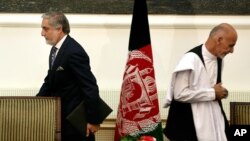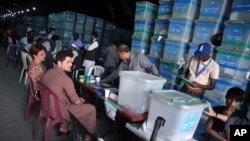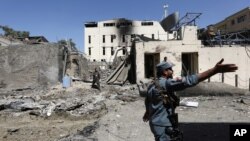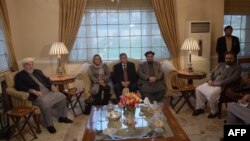Afghan officials say leaders of the beleaguered national unity government are resolved to overcome internal differences so they can jointly tackle security and many other challenges facing the war-torn country.
The pledge comes a day after the United Nations declared the political situation “precarious,” stemming from internal disputes between President Ashraf Ghani and Chief Executive Abdullah Abdullah, and called for a prompt resolution.
A political deal, mediated by the United States to end a protracted election dispute between Ghani and his election rival Abdullah, enabled the two leaders to establish the national unity government in September of 2014. The agreement allowed for the creation of a new chief executive post to share power with the president.
But both Abdullah and Ghani have recently criticized each other of violating commitments of the political deal, publicly exposing simmering tensions as the government marks completion of its two years this month.
Abdullah has complained Ghani does not consult him on key policy decisions as well as governmental appointments, and blamed the president for not moving swiftly on electoral reforms to prevent a repeat of the irregularities that marred the 2014 presidential election. The Afghan president rejects assertions of fraud in the poll.
UN calls for action
The head of the U.N. Assistance Mission in Afghanistan (UNAMA), Tadamichi Yamamoto, underscored the political agenda must progress constructively to maintain political stability in the country.
“The current precarious political situation, including the tensions between the two leaders of the government, must be brought to a resolution. A way must be found to ensure stability in the government for the long term,” Tadamichi said while briefing the Security Council on Wednesday.
“The National Unity Government is at a defining moment. A way forward must be found through realistic and flexible compromise and a show of true statesmanship. The leaders must show to the people of Afghanistan and to the international community that they are able to govern effectively,” he said.
A spokesman for President Ghani, when contacted by VOA, declined to comment on the U.N. criticism of the political tensions.
Javid Faisal, a spokesman for Abdullah, played down the criticism. He told VOA the political differences are “for the best and betterment of the country” and they could not be termed as political crisis or political instability.
“The president and the chief executive are shareholders, they are partners in this national unity government. So, we know that the only option we are left with, the only solution we have to overcome these problems and challenges is to work together,” Faisal said.
Ghani and Abdullah have held four meetings since they went public with their reservations about the 2014 political agreement.
Faisal insisted the two leaders have come up with “some good solutions” in the meetings and are preparing to hold another round soon to ensure the remaining issues are sorted out.
Peace owed to Afghan people
In his speech, UNAMA Chief Yamamoto also appreciated the “sincere” efforts the Afghan government has been making to conclude a peace agreement with the Hizb-e-Islami insurgent group, led by notorious warlord Gulbuddin Hekmatyar.
President Ghani this week promised the peace deal would be finalized in the near future, though critics cite differences in Abdullah’s camp over inclusion of Hekmatyar in the Afghan political mainstream for preventing the government from concluding the truce.
But Faisal dismissed the impression.
“The (government-appointed) High Peace Council in Afghanistan is in dialogue with the Hizb-e-Islami. We hope we will have an agreement with Hizb-e-Islami in the near future and those people will be part of a peaceful and prosperous future of Afghanistan,” he said.
Yamamoto said measures should also be taken to pave the way for “substantive” peace talks with the main Taliban insurgency, reminding the Council of unprecedented levels of civilian casualties this year due to an intensified Taliban insurgency.
“It is imperative that avenues for peace be explored with the utmost urgency and seriousness ... I would therefore urge both sides to come together to find a lasting peace for Afghanistan,” said the U.N. envoy.
Political cover for strongmen
Hekmatyar is a longtime guerrilla commander whose forces fought against the Soviet Union in the 1980s, using equipment supplied by the CIA. Later, his militias battled the Taliban for control of Afghanistan in the 1990s. Human rights groups accused Hekmatyar of committing massive abuses.
The ethnic Pashtun warlord was designated a "global terrorist" by the United States in 2003 for allegedly participating in and supporting attacks by al-Qaida and Taliban forces against U.S. troops. Meanwhile, Ghani’s government, like its predecessor, is under fire for bolstering Afghan strongmen for political gain.
“Hekmatyar is not alone in enjoying impunity for his crimes. None of the Afghan warlords has been held accountable for similar crimes,” Patricia Gossman, senior Afghanistan researcher at the Human Rights Watch, told VOA.
“This lack of accountability and the failed disarmament of abusive militia forces has crippled reforms needed to build effective government institutions essential to a lasting peace. As the war churns on, killing an ever-increasing number of civilians, it’s clear how high a price Afghans have paid for appeasing the warlords.”







